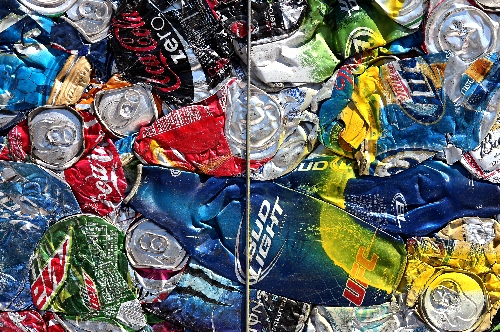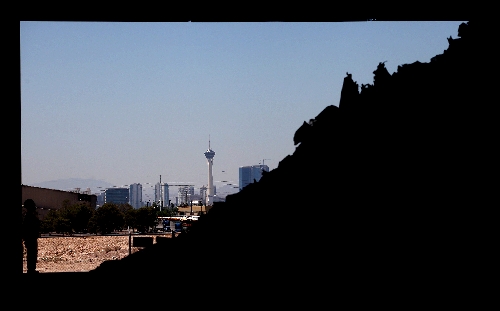Dip in trash volume lets Republic target new clients
Las Vegas is a little less down in the dumps these days.
The trash dumps, that is.
The recession that knocked Sin City on its heels has spared few businesses.
Not even trash disposal. As households cut consumption, businesses folded, construction stopped and hotel-casinos hosted fewer tourists, the volume of garbage headed out to the Apex landfill 20 miles north of Las Vegas dropped dramatically. Combine the downturn with longer-term trends such as increased recycling, and Apex isn't filling up as fast as it once was.
The landfill ranked as the nation's largest in 2008, accepting 3.2 million tons of waste a year, according to trade publication Waste & Recycling News. By November, that annual intake had fallen 34 percent, to 2.1 million tons. Apex also fell to No. 3 on the list of biggest landfills, behind Los Angeles' Puente Hills (2.6 million tons) and Indiana's Newton County landfill (2.3 million tons).
"We definitely have seen reductions (in tonnage)," said Joe Burkel, area president of Republic Services, the Phoenix-based waste-management business that owns Apex and contracts with local governments to collect Southern Nevada's trash. "No doubt the recession has played some role in that. We're seeing less volume from resorts and other commercial businesses, and industrial haul is down as well."
John Campanelli, editor of Waste & Recycling News, noted that even before the recession, total waste generated in the United States was dropping because of increased recycling and improved packaging, among other factors.
The recession accounts for 15 percent to 20 percent of the falloff in landfill volume, Burkel estimated. Some of the remaining decline comes from a shift in business toward Republic's recycling operation.
But the downturn hasn't caused Republic to cut service, and it has actually boosted investment in key areas, including recycling and green energy.
The idea, Republic executives said, is to prepare the company for an economic bounceback.
ONE BIN, NO SORTING
Republic's operation is relatively static, even when trash volumes slide.
The company's routes still cover the same number of miles, and its trucks still have to drive past every house and business in the valley, Burkel said. So Republic's fleet of roughly 750 collection trucks and its staff of nearly 1,200 have held steady. Republic said it's hard to calculate changes in the average volume of waste collected per truck or route in the recession, but an October report in Forbes magazine said Apex receives 9,000 tons of trash a day, down from 15,000 tons in 2007.
Republic's service charges are governed by local ordinances, and change based on inflation rather than business volume. Monthly fees per home decreased slightly in 2010, falling from $13.02 to $12.98, but will go up to $13.19 in July, Burkel said.
But Republic isn't stagnating.
The company is testing single-stream recycling in nearly 80,000 valley homes. Single-stream recycling replaces multiple containers with one bin for all recyclables -- no sorting necessary. The easier process has proved popular: Recycling participation has risen from around 3 percent to 30 percent in households experimenting with single-stream, said Len Christopher, general manager for Republic's Southern Nevada recycling centers.
And at Republic's Evergreen Recycling subsidiary, which serves companies, managers have met a 50 percent drop in refuse from construction by targeting new clients, such as moving companies that need to dispose of packaging, wooden pallets and crates. Evergreen execs have also worked with managers of office parks and retail centers to set up complexwide recycling programs, rather than rely on individual tenants to seek out the company's services.
All things considered, business is up 5 percent on the recycling side in recent years, Christopher said. Its employee count is unchanged at nearly 200 workers.
THE POWER OF TRASH
The slowdown has had its advantages, with the lull giving Republic the time to improve its facilities, and even get into the green-energy sector.
Start with those facilities upgrades. Evergreen is wrapping up on $2.5 million in new equipment, including new conveyors and a new recyclables baler.
"In times like these, we look for opportunities to make sure we have the latest and greatest technology," Christopher said. "We made upgrades to our system so that we can handle more volume when business increases."
Republic has also invested a "significant" amount to build a 10-megawatt power plant fueled by the Apex landfill's methane gas. New Jersey-based power developer Energenic is a partner in the project. NV Energy has agreed to a 20-year deal to buy electricity from the plant, which will capture and convert 60 percent to 90 percent of Apex's methane output. Over time, the landfill's generating capacity will increase as its trash volume rises and produces more methane, Burkel said.
The plant is scheduled for completion by year's end.
Forbes magazine credited Apex for helping to refashion dumps as "highly engineered machines for turning waste into electricity."
And if life-expectancy predictions are any indication, Apex will be around to transform trash into power for a long time.
Burkel said the 2,200-acre landfill has well over 100 years of waste capacity left -- a lifespan that will continue to increase as Republic boosts its recycling programs.
Contact reporter Jennifer Robison at jrobison@reviewjournal.com or 702-380-4512.



















